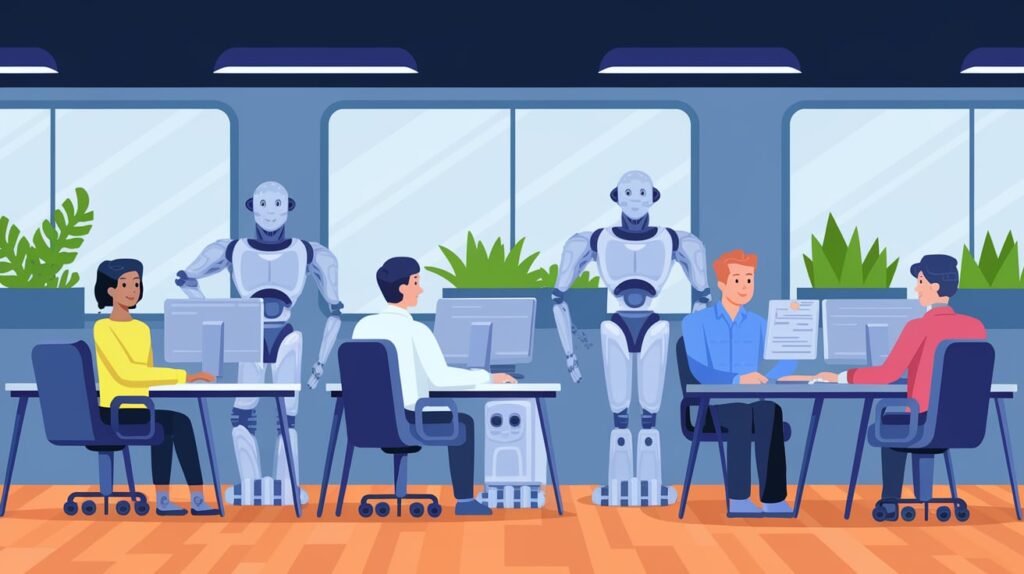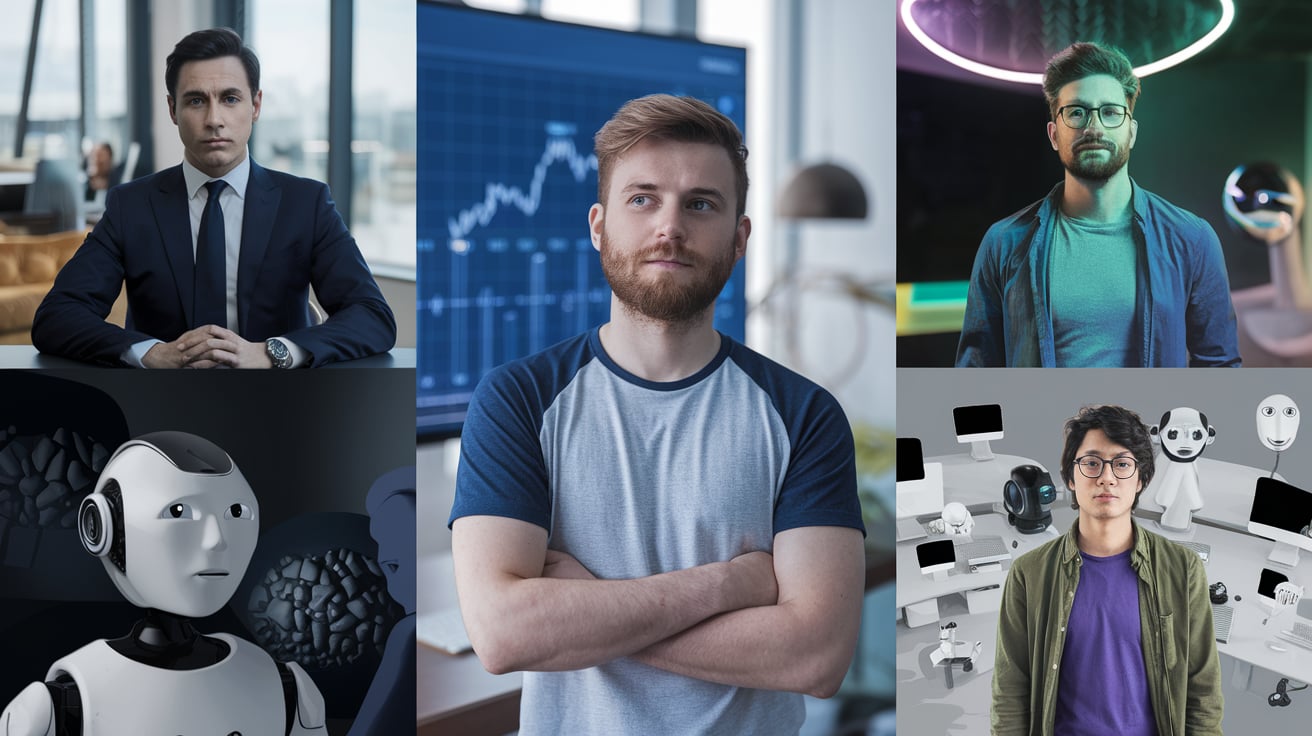Artificial Intelligence (AI) is no longer a futuristic concept confined to science fiction. It’s here, and it’s transforming the way we work, live, and interact with the world. From automating repetitive tasks to enabling data-driven decision-making, AI is reshaping industries and redefining the future of work. Whether you’re an employee, a business leader, or an entrepreneur, understanding how AI is changing the workplace is crucial to staying ahead in this rapidly evolving landscape.
In this blog post, we’ll explore the ways AI is revolutionizing work, the opportunities it presents, and the challenges it brings. By the end, you’ll have a clearer picture of what the future holds and how you can prepare for it.
1. Automation: The Rise of Smart Machines
One of the most significant ways AI is changing work is through automation. AI-powered tools and systems are taking over repetitive, mundane tasks, freeing up human workers to focus on more creative and strategic activities. For example:
- Manufacturing and Logistics: Robots and AI-driven systems are now handling assembly lines, sorting packages, and managing inventory with precision and efficiency.
- Customer Service: Chatbots and virtual assistants are resolving customer queries, booking appointments, and providing 24/7 support.
- Administrative Tasks: AI tools can schedule meetings, manage emails, and even draft reports, reducing the burden on administrative staff.
While automation increases productivity and reduces costs, it also raises concerns about job displacement. AI is Changing the Future However, history has shown that technological advancements often create new roles even as they render others obsolete. The key is to adapt by acquiring new skills and embracing lifelong learning.

2. Enhanced Decision-Making with Data Analytics
AI’s ability to process and analyze vast amounts of data is transforming decision-making across industries. By leveraging machine learning algorithms, businesses can uncover patterns, predict trends, and make informed decisions faster than ever before.
- Healthcare: AI is helping doctors diagnose diseases, recommend treatments, and predict patient outcomes by analyzing medical records and imaging data.
- Finance: Banks and investment firms use AI to detect fraud, assess credit risk, and optimize investment portfolios.
- Marketing: AI-powered tools analyze consumer behavior to personalize marketing campaigns and improve customer engagement.
For professionals, this means that data literacy and the ability to interpret AI-generated insights are becoming essential skills. AI is Changing the Future Those who can work alongside AI to make data-driven decisions will have a competitive edge in the job market.
ALSO READ: New Ways to Run Meta Ads in 2025: A Guide to Staying Ahead in Digital Advertising
3. The Gig Economy and Remote Work
AI is also playing a pivotal role in the rise of the gig economy and remote work. Platforms like Uber, Upwork, and Fiverr use AI algorithms to match freelancers with clients, optimize pricing, and ensure quality control. Similarly, AI-powered collaboration tools like Slack, Zoom, and Microsoft Teams are making remote work more efficient and seamless.
- Flexibility: AI enables workers to choose when, where, and how they work, offering greater flexibility and work-life balance.
- Global Talent Pool: Companies can tap into a global talent pool, while workers can access opportunities beyond their geographic location.
However, the gig economy also comes with challenges, such as job insecurity and lack of benefits. As AI continues to shape this trend, policymakers and businesses will need to address these issues to ensure fair and sustainable work practices.

4. Upskilling and Reskilling: The New Imperative
As AI automates certain tasks, the demand for new skills is growing. Jobs that require creativity, critical thinking, emotional intelligence, and complex problem-solving are becoming more valuable. AI is Changing the Future To stay relevant, workers must embrace upskilling and reskilling.
- Technical Skills: Learning to work with AI tools, programming languages, and data analytics platforms is increasingly important.
- Soft Skills: Skills like communication, collaboration, and adaptability are essential for working effectively in AI-driven environments.
- Lifelong Learning: Continuous learning is no longer optional. Online courses, certifications, and micro-credentials are making it easier for professionals to acquire new skills.
Employers also have a role to play by investing in training programs and fostering a culture of learning. Companies that prioritize employee development will be better positioned to thrive in the AI era.
5. AI and Creativity: A New Frontier
Contrary to the belief that AI is only suited for technical tasks, it’s also making waves in creative fields. AI-powered tools are assisting writers, designers, musicians, and artists in generating content, enhancing creativity, and streamlining workflows.
- Content Creation: Tools like ChatGPT and Jasper AI are helping writers generate ideas, draft articles, and edit content.
- Design: Platforms like Canva and Adobe Firefly use AI to create graphics, suggest layouts, and automate design tasks.
- Music and Art: AI algorithms can compose music, generate artwork, and even mimic the styles of famous artists.
While AI can augment creativity, it’s unlikely to replace human ingenuity. The most successful creative professionals will be those who use AI as a tool to enhance their work rather than relying on it entirely.

6. Ethical Considerations and Bias
As AI becomes more integrated into the workplace, ethical concerns are coming to the forefront. Issues like data privacy, algorithmic bias, and job displacement need to be addressed to ensure that AI is used responsibly.
- Bias in AI: AI systems are only as good as the data they’re trained on. If the data contains biases, the AI will perpetuate them, leading to unfair outcomes in hiring, lending, and other areas.
- Privacy Concerns: The use of AI in surveillance and data collection raises questions about individual privacy and consent.
- Accountability: When AI systems make decisions, it can be challenging to determine who is responsible for the outcomes.
To mitigate these risks, businesses must adopt ethical AI practices, ensure transparency, and involve diverse stakeholders in the development and deployment of AI technologies.
MUST CHECK: How to Grow a New YouTube Channel in 3 Steps Only
7. The Future of Jobs: What to Expect
The future of work in the age of AI is both exciting and uncertain. While some jobs will disappear, new ones will emerge, often requiring a blend of technical and soft skills. Here are a few trends to watch:
- Hybrid Roles: Jobs that combine technical expertise with domain knowledge, such as AI ethicists or data storytellers, will become more common. AI is Changing the Future.
- Human-AI Collaboration: Rather than replacing humans, AI will increasingly serve as a collaborator, enhancing human capabilities and enabling new possibilities.
- Entrepreneurship: AI is lowering barriers to entry for entrepreneurs, enabling them to start businesses with minimal resources and reach global markets.
How to Prepare for the AI-Driven Future
The rapid pace of AI adoption means that staying ahead requires proactive effort. Here are some steps you can take to prepare for the future of work:
- Embrace Lifelong Learning: Continuously update your skills and knowledge to stay relevant in a changing job market.
- Develop a Growth Mindset: Be open to change and willing to experiment with new tools and technologies.
- Focus on Human-Centric Skills: Cultivate skills that AI cannot easily replicate, such as empathy, creativity, and leadership.
- Stay Informed: Keep up with the latest developments in AI and how they impact your industry.
- Advocate for Ethical AI: Support initiatives that promote fairness, transparency, and accounsystems.

NOTE
AI is undeniably changing the future of work, bringing both opportunities and challenges. While it has the potential to boost productivity, enhance decision-making, and create new possibilities, it also requires us to rethink how we work and learn. By embracing change, developing new skills, and advocating for ethical practices, we can harness the power of AI to build a more innovative, inclusive, and sustainable future.
The key takeaway? AI is not just a technological shift—it’s a cultural and societal one. The future of work will be shaped by how we choose to adapt, collaborate, and innovate in the age of AI. The time to prepare is now.


Your point of view caught my eye and was very interesting. Thanks. I have a question for you.